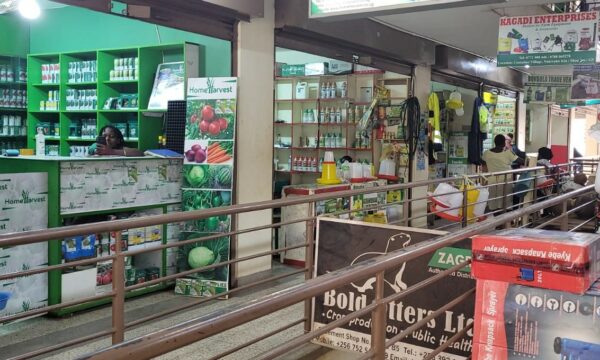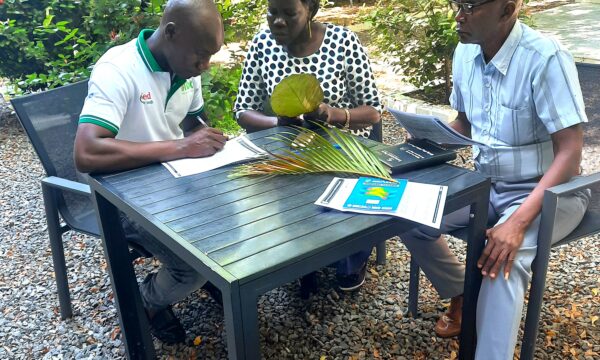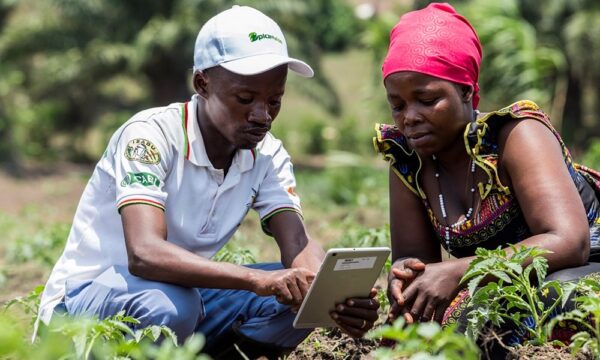The Plantwise programme in Bangladesh was launched with the training for module 1 (Field Diagnosis and Plant Clinic Operation) and module 2 (Introduction to Plant Healthcare) for 32 extension officers in Dhaka early this March. The training followed the signing of a tripartite agreement between the Economic relation division, Ministry of Agriculture and CABI on the 20th January this year. This was followed by signing of a work and funding contract that marked initiation of activities with the national partner to implement the program in the country. Though Plantwise was being implemented by a few NGOs in Bangladesh from 2011, the partnership with Department of Agricultural Extension has opened a new era for the program which has a strong possibility of driving the program to sustainability in the nation. Ten Upojillas (unions) have been selected to conduct ten regular plant clinics in five districts of the country. Dr. Steve Edgington was the CABI trainer who meticulously and consistently captured the attention of 32 trainees as they understood how the symptoms can be easily recognised at field level. The clinic concept is quite new to the country and, although the Farmers Information and Advice Centre is already established by the World Bank as advisory centres to farmers, many farmers could get additional synergies with PW operations as suggested by some newly trained Plantwise doctors.
It was very encouraging to see the complete and punctual attendance of the trainees for all the four days. Their rapt attention during the presentations and active participation in the field as well as in class room exercises was noticeable. Prior to the training the workshop opening session was presided by the Director-General DAE, Director PPW and other eminent staff of the department. This event was captured by the national television media and broadcasted in prime hour throughout the nation. Click this link to see a clip of the television coverage: https://www.dropbox.com/l/sGSepN8iCMnEbAcx1b5khr
Though the women constituted around only 20% of the participating trainees, their enthusiasm and passion to execute the clinics was evident. The commitment of these officers to support farmers to guide them with timely diagnosis in order to reduce the use of pesticide was appreciable. This was also evident by their earlier efforts to bring out certain tools in this focal area. The newly trained plant doctors proudly wore their badges at the end of the training while receiving their certificates. They are now looking forward to April when they will witness a model clinic first-hand. Later in April the plant doctors plan to conduct the first plant clinics in their respective unions and start to provide their farming communities with practical advice in plant health.
5 Comments
Leave a Reply
Related News & Blogs
Plant clinics showcased at Harvest Money Expo in Uganda to help empower the country’s young smallholder farmers
The CABI-led PlantwisePlus programme showcased its plant clinics at the Harvest Money Expo in Uganda to help empower the country’s young smallholder farmers to grow more and lose less to potentially devastating crop pests and diseases. The Harvest Mone…
22 March 2024






Reblogged this on mchaudhary.
Plant wisw Training on “Field Diagnosis and Plant Clinic Operation & giving good recommendations” (Introduction to Plant Healthcare) help a lot of Bangladesh small & marginal farmers whose lives in a long far aria.
Plant doctors of Bangladesh is now successfully operating 10 plant doctor clinics in different parts of our country. These doctors are trained by Dr.Steve ,CABI expert. Farmers are very happy for the service of plant clinic.Field diagnosis is very effective method of “less loss grow more food”.
Thank you, the support from DAE is exemplary to promote and make Plant Clinics popular
[…] Plantwise Bangladesh in a new era of partnership: National Extension Officers trained as Plant Docto… […]